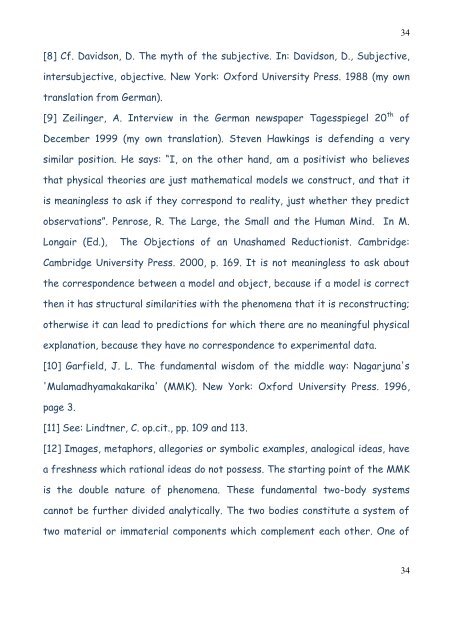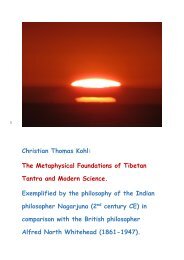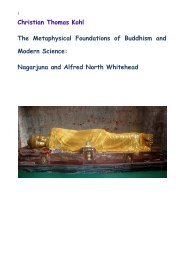The Metaphysical Foundation of Buddhism and Modern Science
The Metaphysical Foundations of Buddhism and Modern Science: Nagarjuna and Alfred North Whitehead
The Metaphysical Foundations of Buddhism and Modern Science: Nagarjuna and Alfred North Whitehead
Create successful ePaper yourself
Turn your PDF publications into a flip-book with our unique Google optimized e-Paper software.
34<br />
[8] Cf. Davidson, D. <strong>The</strong> myth <strong>of</strong> the subjective. In: Davidson, D., Subjective,<br />
intersubjective, objective. New York: Oxford University Press. 1988 (my own<br />
translation from German).<br />
[9] Zeilinger, A. Interview in the German newspaper Tagesspiegel 20 th <strong>of</strong><br />
December 1999 (my own translation). Steven Hawkings is defending a very<br />
similar position. He says: “I, on the other h<strong>and</strong>, am a positivist who believes<br />
that physical theories are just mathematical models we construct, <strong>and</strong> that it<br />
is meaningless to ask if they correspond to reality, just whether they predict<br />
observations”. Penrose, R. <strong>The</strong> Large, the Small <strong>and</strong> the Human Mind. In M.<br />
Longair (Ed.),<br />
<strong>The</strong> Objections <strong>of</strong> an Unashamed Reductionist. Cambridge:<br />
Cambridge University Press. 2000, p. 169. It is not meaningless to ask about<br />
the correspondence between a model <strong>and</strong> object, because if a model is correct<br />
then it has structural similarities with the phenomena that it is reconstructing;<br />
otherwise it can lead to predictions for which there are no meaningful physical<br />
explanation, because they have no correspondence to experimental data.<br />
[10] Garfield, J. L. <strong>The</strong> fundamental wisdom <strong>of</strong> the middle way: Nagarjuna's<br />
'Mulamadhyamakakarika' (MMK). New York: Oxford University Press. 1996,<br />
page 3.<br />
[11] See: Lindtner, C. op.cit., pp. 109 <strong>and</strong> 113.<br />
[12] Images, metaphors, allegories or symbolic examples, analogical ideas, have<br />
a freshness which rational ideas do not possess. <strong>The</strong> starting point <strong>of</strong> the MMK<br />
is the double nature <strong>of</strong> phenomena. <strong>The</strong>se fundamental two-body systems<br />
cannot be further divided analytically. <strong>The</strong> two bodies constitute a system <strong>of</strong><br />
two material or immaterial components which complement each other. One <strong>of</strong><br />
34


















